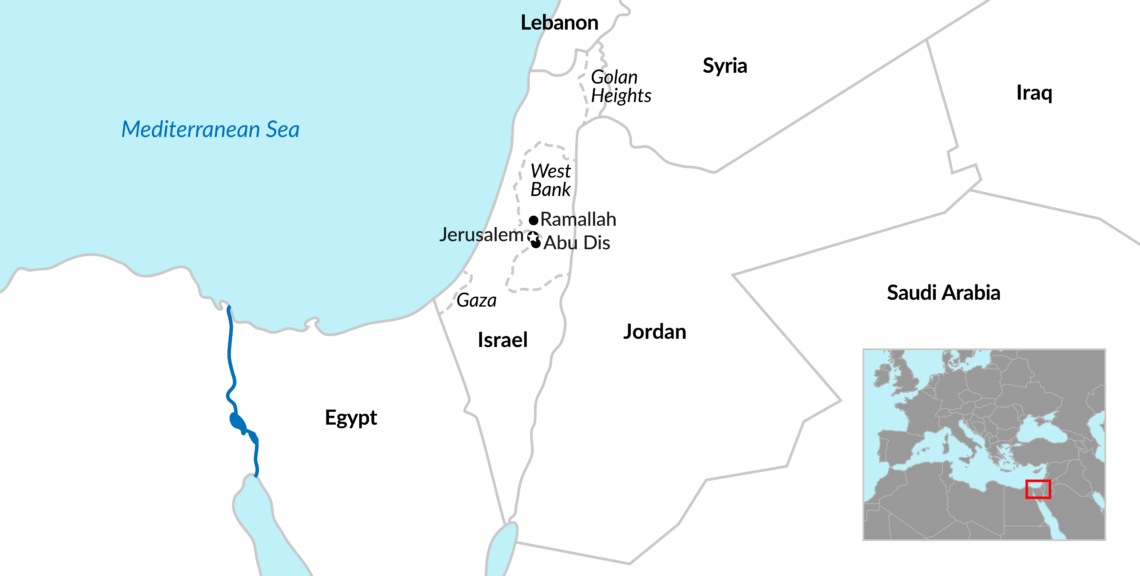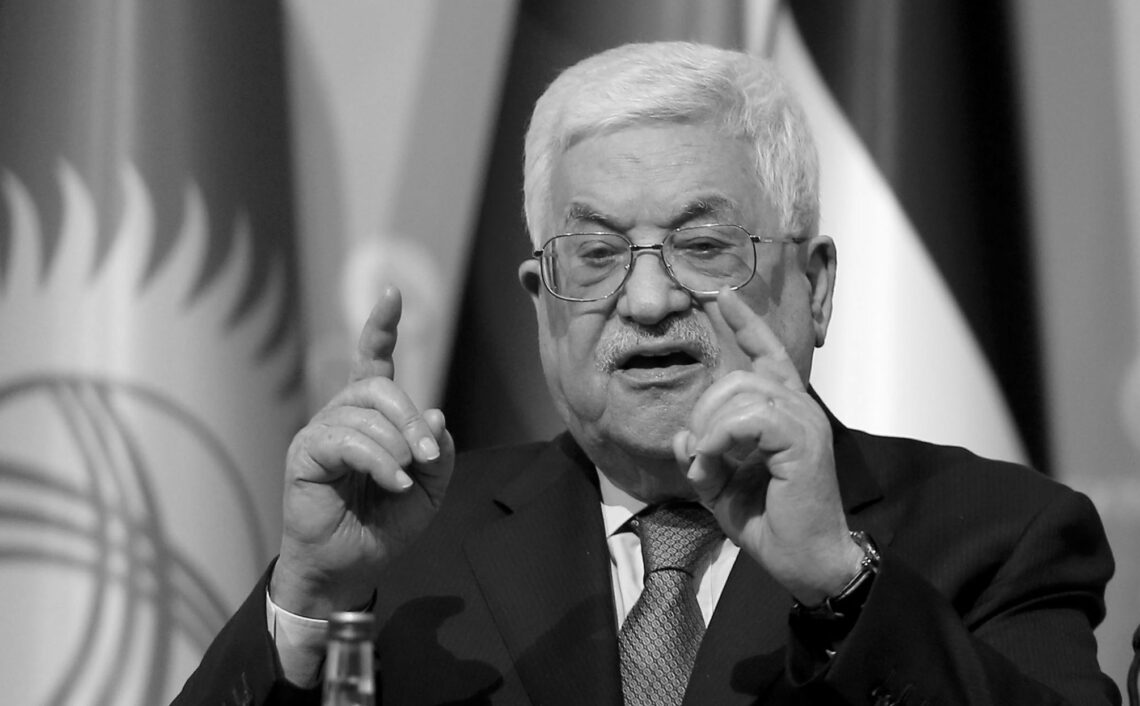The Iran-Sunni feud and prospects for Israeli-Palestinian peace
A rapprochement is settling in between Israel and a group of Sunni Arab states as they work together to counteract Iran’s growing influence. The Israeli-Palestinian conflict, however, is holding back closer cooperation. Could the Saudis pressure the Palestinians to become more flexible and finally accept a peace agreement with Israel?

In a nutshell
- Sunni Arab states are cooperating with Israel against Iran
- The Saudi-led group desperately needs Israel’s help
- The Israeli-Palestinian conflict is preventing the normalization of relations
- Sunni Arab states want a deal, but Mahmoud Abbas is stubbornly preventing it
Tensions between Israel and a Saudi-led group of Sunni states in the Middle East have waned somewhat of late, with the two sides covertly cooperating to counter the threat presented by Iran. Some commentators believe that the relationship could even bring about a resolution to the Israeli-Palestinian conflict. Based on that assumption, Saudi Arabia and its allies, which desperately need Israel’s cooperation, could pressure the Palestinian Authority into accepting a dialogue based on United States President Donald Trump’s proposed “deal of the century.” The issue is being hotly debated in Israel, in the Arab world, and even in the international press.
The dilemma is a very real one for the Gulf countries. In a November 9 debate on the Arabic-language Alhurra satellite television channel, Saudi journalist Muhammad Al-Osaimi called Iran the “obvious and real enemy” of the Arab states. He went on to stress that there could be no alliance against Iran in the Middle East without Israel and that a “just peace” would require full normalization of relations. Others expressed similar views, and the consensus was that Iran, not Israel, was the real threat. The lack of a solution to the Palestinian problem, however, was hampering cooperation.
Indeed, the Palestinian issue has become less of a priority for many Arab states. At a recent debate in Israel, Sarah J. Feuer, a research fellow at the Institute for National Security Studies in Tel Aviv, said that the Arab Spring had made rulers in the region more attuned to internal problems, such as sluggish economies and terrorism. Previously, Arab leaders would use the Palestinian issue as a safety valve to channel their people’s frustration with problems at home.
Capital proposal
If Saudi Arabia is pressuring Ramallah, the strategy does not seem to be working. The Palestinian Authority is “boycotting” President Trump’s peace plan, following his administration’s move to recognize Jerusalem as the capital of Israel and transfer its embassy there. Relations deteriorated further when the U.S. government reduced its annual contribution to United Nations Relief and Works Agency for Palestine Refugees in the Near East (UNRWA) by $200 million and closed the Washington office of the Palestinian Liberation Organization (PLO). The U.S. Agency for International Development (USAID) is due to end its remaining projects in the West Bank and Gaza on January 31.
Riyadh and Cairo attempted to convince the Palestinians to make the Jerusalem suburb Abu Dis their capital.
A few months ago, it was reported that Riyadh and Cairo attempted to convince the Palestinians, at Washington’s behest, to make the Jerusalem suburb Abu Dis their capital. Though it appears to be part of President Trump’s “deal of the century,” this is not a new idea. In 1995 talks to lay out a basis for a future Israel-Palestinian peace treaty, Mahmoud Abbas (also known as Abu Mazen) – now president of the Palestinian National Authority but at the time a deputy of PLO leader Yasser Arafat – and Israel’s economy minister at the time, Yossi Beilin, agreed to make Abu Dis a temporary Palestinian capital. In fact, the Palestinians began building their parliament in Abu Dis, where it also transferred some government institutions, including their security headquarters.
In a speech in January 2018, President Abbas acknowledged that he had received such a proposal from Washington but had rejected it out of hand. How could he accept less than the divided Jerusalem that had been offered the Palestinians at the Camp David summit in 2000 or by Prime Minister Ehud Olmert in 2008? What he neglected to mention was that the Palestinians rejected both of those peace proposals, and that the new Likud regime, led by Prime Minister Benjamin Netanyahu, opposes all attempts to divide Jerusalem.
Tentative detente
Egypt, the Arab world’s largest country by population, has been at peace with Israel for 40 years. Jordan made peace with Israel in 1994. Now, meaningful – if low-profile – relations have been established between Israel and Saudi Arabia, the UAE and Bahrain.
It was the Iranian nuclear threat that led Israel and Saudi Arabia to establish ties, but they grew stronger when it became clear that U.S. President Barack Obama was negotiating a nuclear treaty with Iran despite the serious doubts of these countries, America’s closest allies in the region. That treaty, the Joint Comprehensive Plan of Action (JCPOA), gave Tehran a new impetus to extend its reach throughout the region, threatening both Israel and Saudi Arabia and opened the door for Iran to become a nuclear power within 10 years.

Riyadh and Jerusalem began an intelligence cooperation that included the exchange of information and, it has been hinted, secret operations inside Iran. Some of that cooperation became public knowledge in 2016 when Israel’s then-Defense Minister Moshe Ya’alon shook hands during a European security meeting in Munich with Prince Turki Al-Faisal, the former head of Saudi intelligence. The same year, Anwar Eshki, a retired Saudi general, visited Israel. In November 2017, Gadi Eisenkot, at the time the chief of general staff of the Israeli Defense Forces (IDF), gave an unprecedented interview to the popular Arabic-language website Elaph. He stressed that the two countries saw eye to eye regarding Tehran’s intentions, adding that Israel was ready to exchange data with moderate Arab countries.
However, while Crown Prince Mohammed bin Salman (widely known as MbS) said in an interview with The Atlantic that the Jewish people have “a right to live in their peaceful nation” and “the right to have their own land,” his father, King Salman, condemned the Trump administration’s move to recognize Jerusalem as the capital of Israel. The King has stated that the Palestinian problem is at the top of his country’s agenda and that any independent Palestinian state must have East Jerusalem as its capital. The kingdom is far from ready to openly demonstrate its ties to Israel. In December 2018, it refused to grant visas to the Israeli delegation to an international chess competition in Riyadh (the event was moved to Russia).
Gulf kingdoms such as Bahrain and the UAE did welcome Israelis participating in international conferences and sports events. In October 2018, the Israeli minister of culture and sport traveled to Abu Dhabi with the Israeli delegation to a Judo competition. The flag of Israel was raised, and its national anthem played when two Israelis won gold medals. A representative of Bahrain attended the funeral of former Israeli president Shimon Peres. In September 2017, Bahrain’s King Hamad bin Isa Al Khalifa allowed his subjects to travel to Israel. In 2018, the country’s foreign minister said he did not see a problem in the transfer of the American embassy to Jerusalem.
The creation of Israel was presented as a tragedy: the cause of the Arab world’s ills and even Islamic terrorism.
On October 25, 2018, at the invitation of Sultan Qaboos bin Said, Prime Minister Netanyahu traveled to Oman with several officials. According to the joint communique issued following talks between the two leaders, they discussed ways to promote the peace process in the Middle East. Two weeks later, Israeli Minister for Transport and Intelligence Yisrael Katz participated in a conference of the International Transport Organization in Oman, where he proposed the construction of a railway from the Israeli city of Haifa on the Mediterranean coast, through the Palestinian Authority and Jordan to Saudi Arabia, where it would connect with existing railways in the Gulf. The initiative would significantly ease travel times between the Gulf states and the trade and technological hubs of Israel and Europe.
Normalizing relations with Israel could benefit Gulf countries by giving them access to the country’s expertise in fields such as desalination, agriculture and the fight against terror.
Negotiation standstill
Several factors darken this optimistic outlook. Negotiations between Israel and the Palestinians have been at a standstill since President Obama made halting all construction in the settlements the prerequisite for talks, even though the Oslo Accords stipulated such issues were to be handled through direct talks between the parties. In 2009, Prime Minister Netanyahu did agree on a 10-month construction freeze as a gesture of goodwill, but President Abbas demanded another concession: the release of all Palestinians jailed prior the signing of the Oslo Accords. Since then, the peace process has been stuck.
Then there is the refusal of the Islamic establishment and Arab nationalists to recognize Israel. Can pragmatic Sunni states, threatened by Iran, overcome this political and ideological hurdle to normalize their relationship with Israel and change the Palestinian Authority’s policy?
Normalizing relations with Israel could benefit Gulf countries by giving them access to the country’s expertise.
Ever since the establishment of the State of Israel, the Palestinian issue has been a central focus of Arab states. The creation of Israel was presented as a major tragedy: the cause of the Arab world’s ills and even Islamic terrorism. Following the Six-Day War in 1967, Israel indicated its readiness to return most of the captured territories in exchange for peace. However, the Arab League summit in Khartoum in September of that same year resolved that there would be “no peace with Israel, no recognition of Israel, no negotiations with it.”
Later, however, Egypt did make peace with Israel, as did Jordan. Even Yasser Arafat signed the Oslo Accords. Relations between Israel and the Arabs have turned less militant and an informal peace prevails. Yet terrorist attacks from Palestinian-controlled areas continue. Palestinian leaders refuse to recognize Israel as a Jewish state or to forgo their demand that millions of refugees be granted the right to return. Israel has declared that it is ready to accept a demilitarized Palestinian state, while maintaining a military presence in the Jordan Valley for a period of 15 to 20 years to prevent infiltration to both countries by Islamic terrorists.
Peace-deal roadblock
The Iranian threat, however, remains. While it does, Saudi Arabia and the Gulf states need Israeli (and American) intelligence and support. Israel and Saudi Arabia are the cornerstones of American policy on countering Iran. Washington will continue to urge Saudi Arabia and its allies to put pressure on the Palestinians to be more flexible and eventually accept President Trump’s proposed peace deal. Still, as long as President Abbas holds the reins of leadership, the Palestinian position is unlikely to change.
The elderly leader is unlikely to be swayed. He will continue to resist Saudi pressure and refuse to consider the American peace plan. Though he is 83 years old and a heavy smoker with heart problems, he has not yet named a successor. Should he be incapacitated, Fatah party deputy chairman Mahmoud al-Aloul would take over temporarily, but he is not considered a serious contender. The leading candidates are veteran hardliners.
Several more pragmatic outsiders are poised to run for the presidency of the Palestinian Authority with the backing of the U.S., Egypt or the Gulf countries – and they have a chance because the Palestinian people want change. But until the Israeli-Palestinian conflict is resolved, neither Saudi Arabia nor the Gulf states will dare cross the Rubicon and establish formal relations with Israel.








